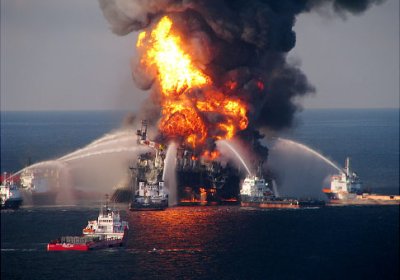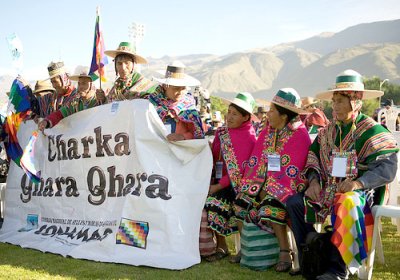The following is an abridged speech by Bolivian President Evo Morales to a meeting of the G77 and China, which brings together 130 developing countries, at the United Nations on May 7. The World People’s Conference on Climate Change and the Rights of Mother Earth was held in Cochabamba, Bolivia over April 19-22. For more information on the conference, and for the full resolutions adopted, visit PWCCC.org.
* * *
Environment
“The time of big energy was supposed to have faded with the election of Barack Obama to the presidency”, Billy Wharton wrote in a May 12 www.counterpunch.org article.
“Then, a humble Coloradan, with a cowboy hat that seemed permanently affixed to his head, named Ken Salazar ambled to the microphone to accept Obama’s nomination to be the new Secretary of the Department of the Interior (DOI).”
For the first time ever, a member of the British Green Party, Caroline Lucas, was elected to parliament in the May 6 general elections. Printed below is a May 7 statement from GreenParty.org.uk
* * *
Greens all over Britain were celebrating this morning as the news was announced that party leader Caroline Lucas had won the Brighton Pavilion seat.
Melbourne-based climate activist Ben Courtice toured Newcastle, Sydney and Wollongong from May 10 to 12 to report back from the World People’s Summit on Climate Change and the Rights of Mother Earth, which took place in Bolivia in April.
The conference was held in Cochabamba and attracted about 35,000 activists. Bolivia’s radical indigenous President Evo Morales convened the summit. Organisers said people from more than 140 countries attended.
In Sydney, 45 people attended a reportback meeting on May 11, sponsored by Green Left Weekly.
An ex-oil worker has told the May 12 Huffington Post that oil giant BP often faked reliability tests for equipment meant to stop spills such as the Deepwater Horizon spill, which began on April 20.
Mike Mason, an oil worker in Alaska for 18 years, said he personally witnessed more than 100 occasions when BP employees manipulated tests on safety valves designed to cut off oil flow in case of emergencies. He said the tests would determine whether the valves could withstand certain amounts of pressure for five minutes at a time.
An angry Prime Minister Kevin Rudd told the May 12 7:30 Report that he was “passionate about acting on climate change”. Yes, we know. But if only he’d stop acting and start doing.
The demise of the Rudd Labor government’s proposed Carbon Pollution Reduction Scheme (CPRS) is not the problem. It’s a good thing. The problem is that the government still has no serious climate change policy.
The tremendous success of the April 19-22 World Peoples Summit on Climate Change and Mother Earth Rights held in Cochabamba, Bolivia, has confirmed the well-deserved role of its initiator — Bolivian President Evo Morales — as one of the world’s leading environmental advocates.
Since being elected the country’s first indigenous president in 2005, Morales has continuously denounced the threat posed by the climate crisis and environmental destruction.
Morales has pointed the figure at the real cause of the problem: the consumerist and profit-driven capitalist system.
A near-disaster involving toxic waste in the southern Perth suburb of Hamilton Hill has revealed that working class neighbourhoods are exposed to potential carcinogens local resident and Socialist Alliance candidate Sanna Andrew said.
The Fremantle Steam Laundry in Hamilton Hill burst into flames in the early hours of May 13. Fire fighters ordered some nearby residents to evacuate because the factory had a stockpile of the dry cleaning chemical perchloroethylene (PCE).
Perhaps no other sector better exemplifies the challenge the Bolivian government faces in lifting the country out of the poverty and dependency afflicting South America’s poorest nation than its all-important mining industry.
Mining minister and former miners’ union leader Jose Pimentel told Green Left Weekly: “Bolivia has been a mining country for more than 500 years, ever since the Spanish came and discovered the legendary wealth [of the silver mines] of Potosi.”
NSW Premier Kristina Keneally announced that the Labor government would block a proposed open-cut coalmine near Scone in the Upper Hunter Valley on May 14.
The decision puts an end to the Bickham coal project, which would have mined coal for the next 25 years, threatening to contaminate the Pages River and other water sources for local farmland. The decision also permanently bans any open-cut coal mines at the Bickham site.
Keneally said: “This mine is simply not compatible with the unique rural characteristics of this locality, including the horse-breeding industry.
“There are two ways forward: Either save capitalism, or save Mother Earth”, Bolivian President Evo Morales said, stressing that this was the choice facing governments at a May 7 press conference in New York. There, he discussed the outcomes of the 35,000-strong World People’s Summit on Climate Change and the Rights of Mother Earth with United Nations Secretary-General Ban Ki-moon.
Under the new constitution approved in January 2009, the state now controls all minerals, metals, precious and semi-precious stones in the country.
While respecting previously granted concessions to private companies, it has restricted new concessions to joint ventures with the state
In 2007, the Bolivian government returned 100% control of the Huanuni tin mine to the state-owned Comibol.
On May 3, the government nationalised the Glencore-owned antimony smelter, which has been out of operation for more than two years.
- Previous page
- Page 292
- Next page







